Does Pressure Make You Work More Efficiently?

As Microsoft plans to deploy their “Find a Partner Campaign” in Microsoft Pinpoint in the coming months, I have been diligently working to update our company profile. After I had worked on this project for many days and hours, the most tragic thing happened…I LOST my document (and no, it was not backed up on my external hard drive like it should have been).
After I lost my treasured work, I was distraught when thinking about the due date looming over my head, which was only three days away. That was when the pressure set in, and I was in complete work mode. There were to be no distractions, because I knew I needed to work faster and more efficiently than normal.
Later that week, after I had made up the work I had lost, I was speaking with a colleague about my dreadful experience. In this conversation, I had said that the pressure had made me work faster, and I attributed my success to that pressure.
In hindsight, I realized that the sentiment I had expressed was characteristic of a century-old psychological theory I have studied many times before. This theory is called the Yerkes-Dodson Law, sometimes referred to as the Inverted-U Hypothesis. The Yerkes-Dodson Law was proposed by Robert Yerkes and John Dodson in 1908, who published the article, Relation of Strength of Stimulus to Rapidity of Habit-formation in a scholarly journal. Even though the theory was published over a century ago, it is still extremely relevant to our modern lifestyles.
This is a complex theory, so to summarize it, I have broken down and defined the main components in their simplest form. Please remember that the theory is much more complex than what is stated below, so if you would like to read the entire article, learn more about the relation of stimulus to the rapidity of habit formation.
Yerkes-Dodson Law
Below is the graphical representation of the Yerkes-Dodson Law:
This theory proposes that there is an optimal level of arousal, and too much or too little arousal can negatively impact performance on a given task.
For example, if the situation is under-challenging or “boring” to the individual, their work is most likely going to be “sloppy” due to the lack of motivation to do their best. If the individual is overwhelmed by the amount of tasks they have, or the scale of the task, they may panic and under perform. The most common examples of too much or too little arousal are professional athletes that “choke” during an important game.
Arousal can be defined as physiological and psychological activation in an organism that prepares the organism for action.
According to the theory, an individual’s best performance is achieved when a person experiences a manageable amount of arousal (stress), which is known as optimal level of arousal. This level varies from person to person.
Stress can be defined as the imbalance between physical and psychological demands. How the individual perceives their ability to meet those demands determines how the individual responds, and a failure to meet those demands results in consequences, such as poor performance.
Applying the Theory to Your Work Day
You may be asking why this theory is important to understand how to optimize your work day. If you can find your optimal level of arousal or flow, you can work more efficiently and produce higher quality work every time. The state of flow is a highly motivated, engaged, and productive state, and the individual is not overwhelmed or struggling to perform. This state is where the best work is done.
The next time you have a large-scale project or an important deadline, think of this theory and try to find your flow. Keep the Yerkes-Dodson Law in mind when juggling tasks and taking on new projects, so you can succeed on each task, not letting any fall through the cracks.
If you’re having a difficulty managing all your daily tasks, read my blog on time management to help you reach your state of flow.
Trending Posts
Stay Informed
Choose Your Preferences
"*required" indicates required fields

